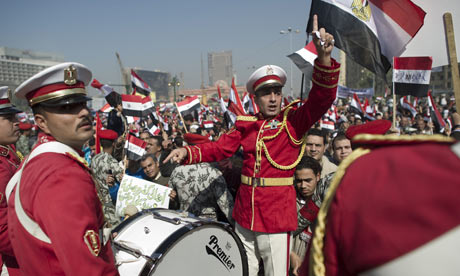By Simon Tisdall

An Egyptian army band plays music in Cairo's Tahrir Squareto celebrate the departure from power of Hosni Mubarak. Photograph: Pedro Ugarte/AFP/Getty
The aftermath of revolution is never pretty or neat. But some Arab spring countries are coping better than others with the impact of this year's region-wide unrest and its unpredictable consequences. At one end of the spectrum stands Morocco. After much debate, and a series of largely peaceful demonstrations by the February 20 opposition movement, modest constitutional reforms proposed by King Mohammad received overwhelming support in a referendum last week.
That's not the end of the story. Thousands of people subsequently took to the streets of Rabat, Casablanca and Tangier, protesting that the reforms did not go far enough. "Morocco is being pushed towards a tipping point. The question is whether limited reform continues or whether much more is needed," said Susi Dennison, coauthor of a new study on how the EU might assist Morocco's democratic evolution, published by the European Council on Foreign Relations (ECFR) thinktank. Similar considerations apply in Tunisia and Algeria, too.
At the other of the spectrum stand Syria and Libya, where the political process, such as it is, has failed, and it's now increasingly possible the extreme violence of recent months could degenerate, in a post-revolutionary situation, into the sort of chaos that beset Iraq after Saddam Hussein's fall. Unlike Libya, western countries and their Gulf Arab allies have not (as yet) directly intervened in Syria. This may or may not be a good thing, depending on how unfolding events in Tripoli and Benghazi are viewed.
Expressing growing frustration at the ongoing attacks on demonstrators in Syria, William Hague, the foreign secretary, came close this week to suggesting Britain and the US may soon adopt a more directly confrontational, personalised approach to Bashar al-Assad's regime. "The UK has made clear that President Assad must reform or step aside. If the regime continues to choose the path of brutal repression, pressure from the international community will only increase," Hague warned.
Libya, for its part, is presently locked in a military and political impasse while Gaddafi's staying power continues to surprise his western adversaries. This cannot last indefinitely, and some regional experts are beginning to worry the west's intervention there could ultimately prove too effective – resulting in what is termed "catastrophic success".
In this scenario, the negotiated settlement between regime and rebels and the orderly departure from power of Muammar Gaddafi that is the UN and Nato's stated aim does not happen. Instead, Gaddafi is killed or flees, his government implodes, the rebels' national transitional council splinters into rival power bases, and unpaid army units and police, renegade mercenaries and tribal militias (armed in some cases by France) commence battle for the nation's oil wealth.
"This is not a benign scenario," said one Libya watcher. "Once Gaddafi has gone we need to quickly establish law and order and some basic public services and nothing else" – in other words, avoid the mistakes made by US forces in Iraq, who tried to run the country. A UN-mandated peacekeeping force, drawn from Arab and Muslim (not western) countries, will be essential in a Libyan post-conflict situation. Whether sufficient time and thought is being spent planning for such eventualities is unclear at this point. "We do not see a large humanitarian problem," the Libya watcher said. "But we do see a post-Gaddafi unrest scenario."
When it comes to Egypt, the beating heart of the Arab spring, post-revolutionary developments (or the lack of them) are worrisome. Ahmed Naguib, a Tahrir Square activist, told an ECFR conference in London this week the political forces that ousted Hosni Mubarak are increasingly fragmented, the energy and ideals of Egypt's youth are being co-opted by an "incompetent" ruling armed forces council, and the country risks losing sight of the democratic prize for which it fought so hard.
"It's not a pretty scene in Cairo at the moment," Naguib said. "Civil society is dysfunctional. There are big problems with policy-making and human rights abuses … The economy is dependent on loans but we need investments, not loans, especially for SMEs [small and medium-sized enterprises]. We need better educational opportunities and independent media capacity-building. We need judicial support and legislative advice, and we need more flexible constitutional mechanisms such as direct referendums."
Nick Witney, former chief of the European defence agency, said the EU's response to the evolving needs of Egypt and other Arab spring countries was inadequate. Instead of seizing the opportunity to bolster an historic democratic moment, Europe's attitude was characterised by "defensiveness and ignorance". It was also exaggerating the threat posed by Islamist organisations such as Egypt's Muslim Brotherhood, whose leaders were for the most part plausible pragmatists, Witney said.
Parag Khanna of the ECFR and the New America Foundation, said the US, too, was guilty of short-sightedness at a moment of great promise. "The Arab spring has brought out all the worst instincts of the Obama administration – lots of rhetoric and high-minded speeches but no practical action to help," he said.
-This commentary was published in The Guardian on 06/07/2011
- Simon Tisdall is an assistant editor of the Guardian and a foreign affairs columnist. He was previously a foreign leader writer for the paper and has also served as its foreign editor and its US editor, based in Washington DC. He was the Observer's foreign editor from 1996-98
- Simon Tisdall is an assistant editor of the Guardian and a foreign affairs columnist. He was previously a foreign leader writer for the paper and has also served as its foreign editor and its US editor, based in Washington DC. He was the Observer's foreign editor from 1996-98
No comments:
Post a Comment